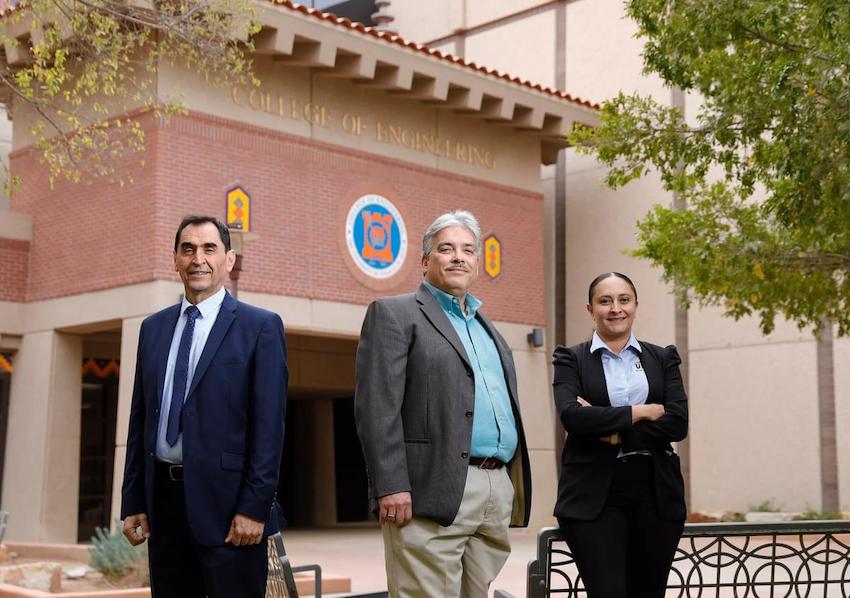
Air Force Awards UTEP Grant to Safeguard Assets in Space
$5M grant will support research on objects that threaten space-based assets
EL PASO, Texas (Nov. 30, 2023) – Space near earth is teeming with objects, whether natural, like meteors and comets, or manmade, like satellites, spacecraft and rocket debris. But experts still need a clearer picture of the location and state of these objects, which can threaten space-based assets, such as GPS, weather-monitoring and communication satellites.

“The United States is dependent economically and militarily on space assets,” said Miguel Velez-Reyes, Ph.D., chair of the Electrical and Computer Engineering Department at The University of Texas at El Paso. “For instance, orbiting satellites provide a multitude of services, which are critical for economic wealth, defense and security.”
Ground-based telescopes, however, cannot currently obtain clear images of space objects that are distant or small. Known as Unresolved Resident Space Objects (URSO), their characteristics, such as shape, dimensions, spin rate and material composition, cannot be easily extracted from telescope images.
Thanks to a new five-year, $5 million grant from the Air Force Office of Scientific Research (AFOSR) Space University Research Initiative (SURI), UTEP is leading a new research effort that hopes to bring these objects to light.
Velez-Reyes, the grant’s principal investigator, will spearhead a team that includes UTEP Associate Professor of Practice Hector Erives, Ph.D., and Research Assistant Professor Aryzbe Najera, Ph.D., as well as collaborators from outside the University.
The team will use spectroscopy to study URSOs. They will specifically integrate remote sensing, physics-based simulation models, machine learning and laboratory experiments with telescope observations to develop models and algorithms that extract properties of the URSOs, such as material composition, structural health and object identity.
Results from the research have both defense and commercial applications, Velez-Reyes said. The team’s findings will be used to monitor the health of government-owned and commercial space assets and to monitor the traffic of objects in the Earth’s outer orbit to ensure that the space infrastructure responsible for services, such as GPS, is not compromised.
“Through this project, we’re addressing the critical need of monitoring the space infrastructure for safe and sustainable operations,” Velez-Reyes said. “Aside from the clear defense applications, our work will contribute to ensuring that space services such as GPS, weather satellites, satellite communication among many others, continue operating in a safe environment supporting a high quality of life.”
Kenith Meissner, Ph.D., dean of the College of Engineering, said, “UTEP has made a concerted effort to be at the forefront in the fields of study that are valuable to the space industry. This recognition not only acknowledges our research accomplishments, but it also emphasizes the exceptional quality our faculty. Earning this competitive grant validates UTEP’s track record in managing high priority initiatives and producing significant results that greatly contribute to both military and civilian objectives.”
Velez-Reyes added that the research will be of value to the U.S. Space Force, the National Oceanographic and Atmospheric Administration and commercial providers of space services.
The grant from AFOSR SURI is titled, “The Science of Non-Resolved Space Object Signatures for Space Domain Awareness.”
Additional team members are Francis Chun, Ph.D., from the U.S. Air Force Academy; Gregory Badura, Ph.D.; Elena Plis, Ph.D.; and Douglas Hope, Ph.D. from Georgia Tech Research Institute; and Michael Gartley, Ph.D., from Rochester Institute of Technology.
About The University of Texas at El Paso
The University of Texas at El Paso is America’s leading Hispanic-serving university. Located at the westernmost tip of Texas, where three states and two countries converge along the Rio Grande, 84% of our 24,000 students are Hispanic, and more than half are the first in their families to go to college. UTEP offers 171 bachelor’s, master’s and doctoral degree programs at the only open-access, top-tier research university in America.
Last Updated on November 30, 2023 at 12:00 AM | Originally published November 30, 2023
By MC Staff$5M grant will support research on objects that threaten space-based assets UTEP Marketing and Communications
